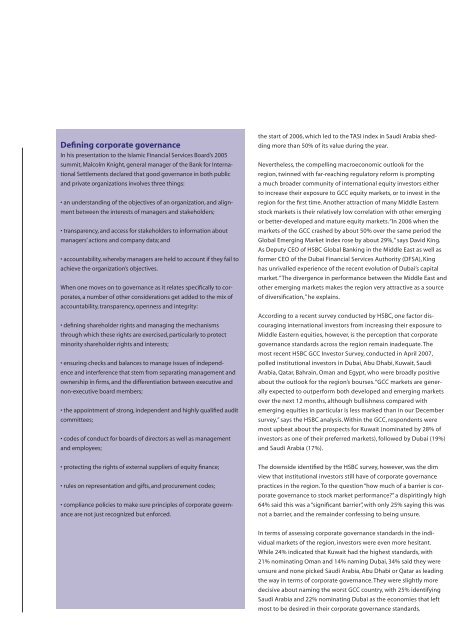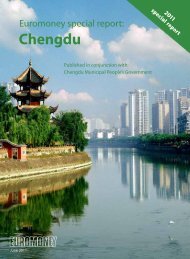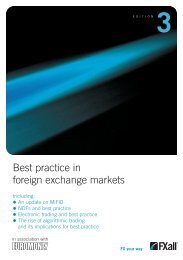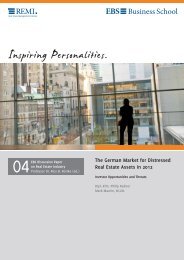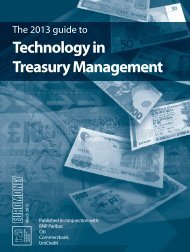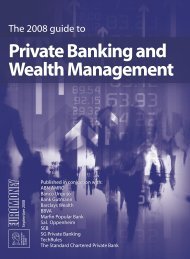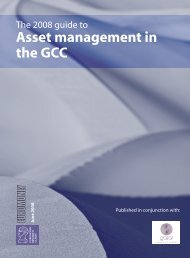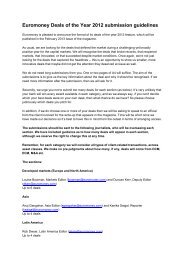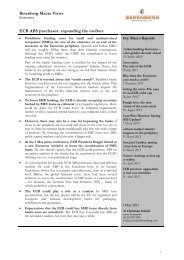Corporate Governance in the GCC - Euromoney
Corporate Governance in the GCC - Euromoney
Corporate Governance in the GCC - Euromoney
- No tags were found...
You also want an ePaper? Increase the reach of your titles
YUMPU automatically turns print PDFs into web optimized ePapers that Google loves.
Def<strong>in</strong><strong>in</strong>g corporate governanceIn his presentation to <strong>the</strong> Islamic F<strong>in</strong>ancial Services Board’s 2005summit, Malcolm Knight, general manager of <strong>the</strong> Bank for InternationalSettlements declared that good governance <strong>in</strong> both publicand private organizations <strong>in</strong>volves three th<strong>in</strong>gs:• an understand<strong>in</strong>g of <strong>the</strong> objectives of an organization, and alignmentbetween <strong>the</strong> <strong>in</strong>terests of managers and stakeholders;• transparency, and access for stakeholders to <strong>in</strong>formation aboutmanagers’ actions and company data; and• accountability, whereby managers are held to account if <strong>the</strong>y fail toachieve <strong>the</strong> organization’s objectives.When one moves on to governance as it relates specifically to corporates,a number of o<strong>the</strong>r considerations get added to <strong>the</strong> mix ofaccountability, transparency, openness and <strong>in</strong>tegrity:• def<strong>in</strong><strong>in</strong>g shareholder rights and manag<strong>in</strong>g <strong>the</strong> mechanismsthrough which <strong>the</strong>se rights are exercised, particularly to protectm<strong>in</strong>ority shareholder rights and <strong>in</strong>terests;• ensur<strong>in</strong>g checks and balances to manage issues of <strong>in</strong>dependenceand <strong>in</strong>terference that stem from separat<strong>in</strong>g management andownership <strong>in</strong> firms, and <strong>the</strong> differentiation between executive andnon-executive board members;• <strong>the</strong> appo<strong>in</strong>tment of strong, <strong>in</strong>dependent and highly qualified auditcommittees;• codes of conduct for boards of directors as well as managementand employees;<strong>the</strong> start of 2006, which led to <strong>the</strong> TASI <strong>in</strong>dex <strong>in</strong> Saudi Arabia shedd<strong>in</strong>gmore than 50% of its value dur<strong>in</strong>g <strong>the</strong> year.Never<strong>the</strong>less, <strong>the</strong> compell<strong>in</strong>g macroeconomic outlook for <strong>the</strong>region, tw<strong>in</strong>ned with far-reach<strong>in</strong>g regulatory reform is prompt<strong>in</strong>ga much broader community of <strong>in</strong>ternational equity <strong>in</strong>vestors ei<strong>the</strong>rto <strong>in</strong>crease <strong>the</strong>ir exposure to <strong>GCC</strong> equity markets, or to <strong>in</strong>vest <strong>in</strong> <strong>the</strong>region for <strong>the</strong> first time. Ano<strong>the</strong>r attraction of many Middle Easternstock markets is <strong>the</strong>ir relatively low correlation with o<strong>the</strong>r emerg<strong>in</strong>gor better-developed and mature equity markets. “In 2006 when <strong>the</strong>markets of <strong>the</strong> <strong>GCC</strong> crashed by about 50% over <strong>the</strong> same period <strong>the</strong>Global Emerg<strong>in</strong>g Market <strong>in</strong>dex rose by about 29%,” says David K<strong>in</strong>g.As Deputy CEO of HSBC Global Bank<strong>in</strong>g <strong>in</strong> <strong>the</strong> Middle East as well asformer CEO of <strong>the</strong> Dubai F<strong>in</strong>ancial Services Authority (DFSA), K<strong>in</strong>ghas unrivalled experience of <strong>the</strong> recent evolution of Dubai’s capitalmarket. “The divergence <strong>in</strong> performance between <strong>the</strong> Middle East ando<strong>the</strong>r emerg<strong>in</strong>g markets makes <strong>the</strong> region very attractive as a sourceof diversification,” he expla<strong>in</strong>s.Accord<strong>in</strong>g to a recent survey conducted by HSBC, one factor discourag<strong>in</strong>g<strong>in</strong>ternational <strong>in</strong>vestors from <strong>in</strong>creas<strong>in</strong>g <strong>the</strong>ir exposure toMiddle Eastern equities, however, is <strong>the</strong> perception that corporategovernance standards across <strong>the</strong> region rema<strong>in</strong> <strong>in</strong>adequate. Themost recent HSBC <strong>GCC</strong> Investor Survey, conducted <strong>in</strong> April 2007,polled <strong>in</strong>stitutional <strong>in</strong>vestors <strong>in</strong> Dubai, Abu Dhabi, Kuwait, SaudiArabia, Qatar, Bahra<strong>in</strong>, Oman and Egypt, who were broadly positiveabout <strong>the</strong> outlook for <strong>the</strong> region’s bourses. “<strong>GCC</strong> markets are generallyexpected to outperform both developed and emerg<strong>in</strong>g marketsover <strong>the</strong> next 12 months, although bullishness compared wi<strong>the</strong>merg<strong>in</strong>g equities <strong>in</strong> particular is less marked than <strong>in</strong> our Decembersurvey,” says <strong>the</strong> HSBC analysis. With<strong>in</strong> <strong>the</strong> <strong>GCC</strong>, respondents weremost upbeat about <strong>the</strong> prospects for Kuwait (nom<strong>in</strong>ated by 28% of<strong>in</strong>vestors as one of <strong>the</strong>ir preferred markets), followed by Dubai (19%)and Saudi Arabia (17%).• protect<strong>in</strong>g <strong>the</strong> rights of external suppliers of equity f<strong>in</strong>ance;• rules on representation and gifts, and procurement codes;• compliance policies to make sure pr<strong>in</strong>ciples of corporate governanceare not just recognized but enforced.The downside identified by <strong>the</strong> HSBC survey, however, was <strong>the</strong> dimview that <strong>in</strong>stitutional <strong>in</strong>vestors still have of corporate governancepractices <strong>in</strong> <strong>the</strong> region. To <strong>the</strong> question “how much of a barrier is corporategovernance to stock market performance?” a dispirit<strong>in</strong>gly high64% said this was a “significant barrier”, with only 25% say<strong>in</strong>g this wasnot a barrier, and <strong>the</strong> rema<strong>in</strong>der confess<strong>in</strong>g to be<strong>in</strong>g unsure.In terms of assess<strong>in</strong>g corporate governance standards <strong>in</strong> <strong>the</strong> <strong>in</strong>dividualmarkets of <strong>the</strong> region, <strong>in</strong>vestors were even more hesitant.While 24% <strong>in</strong>dicated that Kuwait had <strong>the</strong> highest standards, with21% nom<strong>in</strong>at<strong>in</strong>g Oman and 14% nam<strong>in</strong>g Dubai, 34% said <strong>the</strong>y wereunsure and none picked Saudi Arabia, Abu Dhabi or Qatar as lead<strong>in</strong>g<strong>the</strong> way <strong>in</strong> terms of corporate governance. They were slightly moredecisive about nam<strong>in</strong>g <strong>the</strong> worst <strong>GCC</strong> country, with 25% identify<strong>in</strong>gSaudi Arabia and 22% nom<strong>in</strong>at<strong>in</strong>g Dubai as <strong>the</strong> economies that leftmost to be desired <strong>in</strong> <strong>the</strong>ir corporate governance standards.


